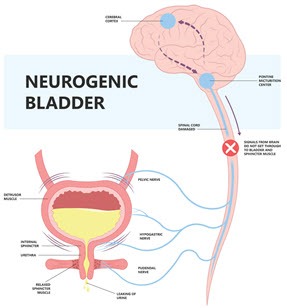
Neurogenic Bladder : Basics
What is a Neurogenic Bladder?
A Urinary bladder which has been affected because of a neurologic condition (condition arising from damage to the brain, spinal cord or nerves) is called a neurogenic bladder. The most common neurologic conditions to affect the bladder are stroke, Parkinsonism, spinal cord injury, spinal surgeries, multiple sclerosis, birth defects affecting the spine (meningomylocele and spina bifida) and pelvic surgeries affecting the nerves. Essentially the ‘genesis’ of neuro “genic” is actually a neurological condition and the bladder just happens to be at the effect of it.
What are the symptoms of Neurogenic bladder?
The common symptoms in neurogenically affected bladders are urinary incontinence, inability to pass urine on their own and need for a catheter, recurrent severe urinary infections and occasionally kidney failure.
What are the types of urinary bladder? Is Neurogenic bladder risky for kidneys?
Neurogenic bladder can be categorised as low or high risk depending on the risk it poses to the functions of the kidneys or potential for severe kidney infections. As Urologists, our primary aim is to identify high risk urinary bladders and minimise the risk to the kidneys.

Conditions which cause low risk neurogenic bladder are generally conditions of the brain including stroke or Parkinsonism whereas the conditions involving the spinal cord like multiple sclerosis, spin bifida and spinal cord injuries tend to cause a high risk neurogenic bladder
Role of a Urologist in Neurogenic Bladder: How do we investigate a Neurogenic Bladder?
As Urologist our first aim is to categorise the neurogenic bladder to the risk category.
We do so on the basis of knowing the underlying neurological condition, asking for the history of severe infections, looking for signs like swelling in the kidneys (hydronephrosis) and long standing pus in the bladder (floating internal echoes) on ultrasound. We also asses post void residual urine (PVRU) on ultrasound as very often patients with neurogenic bladder unknowingly hold a lot of residual urine in their bladders.
We may also ask for kidney function tests, Urine cultures, Voiding cystourethrogram (VCUG or MCU) to look for bladder changes or if the urine goes upwards from bladder to the kidneys (vesicoureteric reflux-VUR).
Based on the above tests, if we are suspecting high risk neurogenic bladder, we also ask to get aUrodynamic Study. The information we get by this study is paramount as it tells how the bladder is behaving during storage and voiding phases of bladder cycle. As most of our day’s time is spent in storing urine and evacuation happens only for proportionately very little time in a day ( one passes urine not more than 7-8 times in a day, maximum stretch the time spent in loo would not be more than 10-15 minutes in a day!), so the storage phase bladder pressures should not be high to pose a risk to the kidney because of ‘back pressure’. Urodynamics helps understanding the pressures in the bladder during the storage phase. Moreover, a Voiding Urodynamic study also asses the attempts to pass urine and whether the bladder is generating adequate or higher than required pressures to evacuate urine from the bladder and how efficiently it is able to empty the bladder (the more efficient the bladder empties, the lesser risky it is for developing UTIs).
Can Neurogenic Bladder be cured? Neurogenic bladder can only be managed. It cannot be cured. However, there are chances for spontaneous recovery which depends on the type and nature of the basic neurological condition. The effect on the bladder resulting from Minor strokes has good chances of recovery. Similarly, the effect after spinal surgeries can be completely reversible if the damage to nerves is minimal and has been dealt with promptly. Spinal cord injuries from trauma may not recover completely if the damage is severe. The neurogenic bladder from birth defects of the spinal cord have no possibility of spontaneous cure.
2 thoughts on “Neurogenic Bladder : Basics”
Leave a Reply
You must be logged in to post a comment.

Thanks alot for sharing the valuable knowledge sir.
Very informative sir